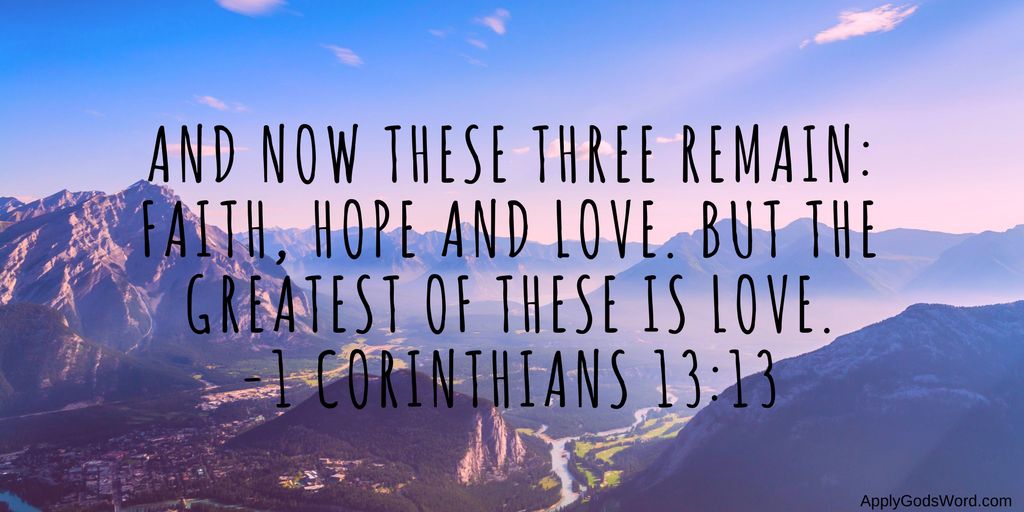
What does the Bible say about faith, hope, and love? 1 Corinthians 13:13 (NIV) says, “And now these three remain: faith, hope and love. But the greatest of these is love.”
In context Paul lists faith, hope, and love as three primary gifts all Christians will always have. 1 Corinthians 12 to 14 are three chapters focusing mainly on spiritual gifts. While the more specific spiritual gifts like prophecy, tongues, teaching, and so on are obviously important in Christianity, Paul here elevates these three gifts and states other gifts will vanish one day (1 Corinthians 13:8-10) but these three will remain.
To me it’s always seemed a bit random to list faith, hope, and love together. What’s the connection here? And why is love elevated above faith and hope?
It may surprise you, as it did me, that when you begin to study what the Bible says about faith, hope, and love, you will find that these three are linked in other places (Galatians 5:5-6, 1 Thessalonians 1:3, 1 Thessalonians 5:5-8) other than 1 Corinthians 13:13 as well.
What Does the Bible Say About Faith?
Faith is perhaps the most abused Christian term because it has been adopted by so many religions and people who use it entirely different than the Bible.
You are safe when you talk about “faith” these days. It is a pacified word because culturally people know you don’t simply mean one truth, religion, or Savior is being highlighted when you say something like, “I have faith,” or, “I’m a person of faith,” or “What faith group are you from?”
While it is socially acceptable to “have faith,” it is still and will always be disrupting and awkward to the world when you state, “I have faith in Jesus Christ.” Faith as the world uses this word is worthless since the object of this type of faith is not important. The world says you can believe in whatever you want as long as you are not stating other people’s beliefs are lesser than your own.
While Christians certainly should not be prideful or arrogant about their superior faith, we must also be clear for our own benefit and the world’s what we mean when we say we have faith. When the Bible talks about faith, the object of that faith is always the same, Jesus Christ.
But what is faith exactly: Faith is believing in things not seen (Hebrews 11:1). There’s more to faith than that, but there’s not less.That’s the baseline definition of faith at least. Faith is not absent of evidence, only of sight. So even though there’s a lot of strong evidence for Jesus as God, we have faith in Jesus because we did not see with our own eyes what he did on earth, we do not fully see him now, and we obviously cannot see the future. But this does not mean we have blind faith or a faith not rooted in evidence and objective truth.
What Does the Bible Say About Hope?
Faith and hope are very similar. Most define “hope” as an expectation for something good. Biblically this is accurate in that hope looks ahead to the future promises in Christ that are not yet fully realized at this point in history. I believe hope is when your faith is expressed towards the future.
Faith is more general than hope because it relates to the past, present and future. A Christian has faith in the historical works of God like the birth, life, death, resurrection, and ascension of Christ. These are events that actually happened even though we don’t see them. And today we have faith that the historical work of the gospel accomplishes certain blessings for us right now.
Again, faith and hope are certainly connected, “Now faith is confidence in what we hope for and assurance about what we do not see” (Hebrews 11:1). But when faith is pointed towards the future and towards blessings not yet fully given, I believe this is when the Bible includes the word hope. For example:
“But if we hope for what we do not see, we wait for it with patience.” (Romans 8:25)
“Waiting for our blessed hope, the appearing of the glory of our great God and Savior Jesus Christ.” (Titus 2:13)
We are “waiting for our blessed hope” and “we wait for [Him] with patience.”
What Does the Bible Say About Love?
Out of faith, hope, and love Christians are probably most familiar with what the Bible says about love. In short, love is more than a thought or a feeling according to the Bible. True love is an action. Love is when you do what’s best for another at whatever cost to yourself (John 15:13).
Love, therefore, is always something expressed in the present. You can’t point to your love in the past and then escape the duty of love in the present. You can’t promise to love someone later and not love them now. Christian love is an action meant to be repeated over and over again each moment as we live our lives.
How Do Faith, Hope and Love Fit Together?
So how does faith, hope, and love work together? What is the meaning of these three being linked together?
One thing that faith, hope, and love all have in common is that they all affect the way we live in the present. While faith and hope can be rooted in past and future events, when we have faith and hope it changes the way we live. As 1 Thessalonians 1:3 (ESV), “ . . . remembering before our God and Father your work of faith and labor of love and steadfastness of hope in our Lord Jesus Christ.”
 Here again faith, hope, and love are linked together. But this time it seems they are all listed because of their common effect on our present. It says the “work of faith,” and the “labor of love” and the “steadfastness of hope.” I think the NIV translation helps us understand the meaning of this, “We remember before our God and Father your work produced by faith, your labor prompted by love, and your endurance inspired by hope in our Lord Jesus Christ.”
Here again faith, hope, and love are linked together. But this time it seems they are all listed because of their common effect on our present. It says the “work of faith,” and the “labor of love” and the “steadfastness of hope.” I think the NIV translation helps us understand the meaning of this, “We remember before our God and Father your work produced by faith, your labor prompted by love, and your endurance inspired by hope in our Lord Jesus Christ.”
The “work of faith” means our good works are produced out of our faith in Jesus Christ. As James 2:17 states, “So also faith by itself, if it does not have works, is dead.”
The “labor of love” means our efforts and services are motivated out of our genuine love for God and people. As 1 John 4:20 explains, “If anyone says, ‘I love God,’ and hates his brother, he is a liar.” If you have true, Christian love, you will have the evidence of “labor” to prove it. You know a tree by its fruit (Matthew 7:17).
The “steadfastness of hope” is the endurance that is inspired out of our faith placed in the blessings of the future. When times are hard in the present, the only way to keep going is to look to better days ahead. As Hebrews 12:1-2 explains, Jesus had endurance through the torture of the cross because he was looking ahead to future joy:
“. . . let us also lay aside every weight, and sin which clings so closely, and let us run with endurance the race that is set before us, 2 looking to Jesus, the founder and perfecter of our faith, who for the joy that was set before him endured the cross . . . .”
If we want endurance in the present, we must, like Christ, look to the future joy ahead of us. Again, our faith, hope and love are not generic but must be rooted “in our Lord Jesus Christ” (1 Thessalonians 1:3).
Why Is Love Elevated Above Faith and Hope?
The Bible says, “And now these three remain: faith, hope and love. But the greatest of these is love” (1 Corinthians 13:13).
I believe love is the greatest of these three virtues because love is the goal of these three virtues. As we just discussed in the previous section, faith, hope, and love all produce Christian actions right now in the present. But what type of actions and good deeds are we called to? All the commands are summarized in loving God and loving people (Matthew 22:38-39).
Faith and hope are beliefs about the past, present, and future that should result in actions of love right now. Faith and hope need to happen in each moment presently for each Christian. But the end result of faith and hope should be love for God and people right now.
When faith produces good works, they are to be good works of love. When hope looks to the future perfections we will experience in Christ, it causes us to live lives of love with endurance right now. Love is “greater” than faith and hope because without love being produced through faith and hope, you don’t actually have a true and biblical version of these two virtues.
Love is above faith and hope because our present actions and choices are always the most important. Once the moment passes you are still responsible to love in this present moment. All you have control over are your actions right now. If you love less because you look to the past or future, your faith and hope are missing their true intentions. Perhaps Galatians 5:5-6 summarizes all this best:
For through the Spirit, by faith, we ourselves eagerly wait for the hope of righteousness. 6 For in Christ Jesus neither circumcision nor uncircumcision counts for anything, but only faith working through love.”
What Does the Bible Say About Faith, Hope, and Love?
Faith, hope, and love are the three gifts every Christian will always have. The Bible says faith, hope, and love all should affect the way we live, but love must link everything together in every moment, “And above all these put on love, which binds everything together in perfect harmony” (Colossians 3:14).
You may also like:
Get your copy of Basic Transformation (plus the study questions, which makes this a great eBook for small group Bible studies or personal devotional time) and access to all of our eBooks. It's completely free - my gift to you.
Type in your email address and a copy will be sent right to your inbox.
